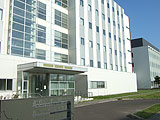Laboratory
 Hokkaido University Graduate School of Life Science,
Hokkaido University Graduate School of Life Science,
Faculty of Advanced Life Science,
Innate Immunity Laboratory [Nakamura Laboratory]
Members
Professor
Kiminori Nakamura,D.D.S., Ph.D E-mail: kiminori【@】sci.hokudai.ac.jp (Remove 【】 mark.)
Assistant Professor
Yuki Yokoi, Ph.D
Research projects and message
Regulation of intestinal innate immunity and “intestinal environment” by Paneth cell α-defensins
Multicellular organisms including humans deal with microbes by fighting against them as well as benefiting from them. Antimicrobial peptides (AMPs) are gene-encoded major effector molecules in innate immunity. Among AMPs, α-defensins have been known to elicit potent microbicidal activity with broad spectrum and less resistance to pathogens. Among various mucosal surfaces, intestinal mucosa is a site where hosts meet huge number of microbes, intestinal microbiota, continuously. Paneth cells in the small intestine produce α-defensins in their cytoplasmic granules and secrete them onto the gut surface in response to bacteria. One goal of our research projects is to understand how innate immune system in the intestine works, by focusing on Paneth cells and their α-defensins, named cryptdins in mice and HD5 in humans. Recently, we have revealed that secreted Paneth cell α-defensins have potent bactericidal activities against pathogenic bacteria, whereas have no or very weak bactericidal activities against normal commensal bacteria, suggesting symbiotic effects of Paneth cell α-defensins. This finding created a new paradigm of α-defensins in health and in many diseases such as inflammatory bowel disease (IBD), infectious diseases and graft-versus-host disease. In addition, we are interested in and working hard to understand relationship between “food” and “health” via functions of Paneth cells and other lineages of intestinal epithelial cells. By bringing basic science in innate immunity, inflammation, regeneration and nutrition absorption etc. to bedside, we will understand real associations of “health” and “disease” and contribute to patients with intractable diseases. All members of Innate Immunity Laboratory (Nakamura Lab) in Hokkaido University are eager to clarify and develop new paradigm in the “intestinal environment”.
Address
North 21 West 11, Kita-ku, Sapporo, Hokkaido 001-0021, Japan
Frontier Research for Post-Genomic Science and Technology Building 4th floor,
Hokkaido University Graduate School of Life Science, Faculty of Advanced Life Science,
Innate Immunity Laboratory
![Hokkaido University Graduate School of Life Science, Faculty of Advanced Life Science, Department of Cell Biological Science, Innate Immunity Laboratory[Ayabe Laboratory] Hokkaido University Graduate School of Life Science, Faculty of Advanced Life Science, Department of Cell Biological Science, Innate Immunity Laboratory[Ayabe Laboratory]](https://altair.sci.hokudai.ac.jp/infsig/res/ec-en.jpg)